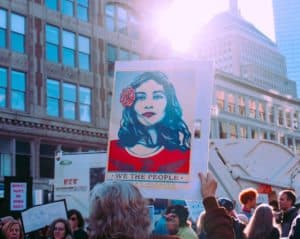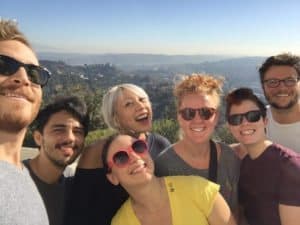“We are asking everyone in our community to take responsibility for their part. We ask all of our filmmakers to make a public facing statement about how their project is increasing inclusion in entertainment. We make it very clear to our audiences that what we curate are not just great films, but diverse lenses through which to look at the world. We hold ourselves accountable to our values of inclusion, community, empathy, integrity and creative energy by being transparent, positive and solutions oriented. We try to also hold our partners to the same standards to the best of our ability.”
 This past week Seed&Spark, the subscription streaming and crowdfunding platform focused on making entertainment more diverse and inclusive, shared its crowdfunding rally 2018 plans with a goal of bringing hundreds of thousands of dollars in matching loans, grants and investments from prestige brands and production company partners to the filmmakers using their platform. The Duplass Brothers will host the second #HometownHeroes crowdfunding rally in 2018, and Bow and Arrow Entertainment, 3311 Productions, The Orchard and premiere file sharing platform WeTransfer will host new rallies.
This past week Seed&Spark, the subscription streaming and crowdfunding platform focused on making entertainment more diverse and inclusive, shared its crowdfunding rally 2018 plans with a goal of bringing hundreds of thousands of dollars in matching loans, grants and investments from prestige brands and production company partners to the filmmakers using their platform. The Duplass Brothers will host the second #HometownHeroes crowdfunding rally in 2018, and Bow and Arrow Entertainment, 3311 Productions, The Orchard and premiere file sharing platform WeTransfer will host new rallies.
 Emily Best: Women have always performed well in crowdfunding. It plays to our strengths. However, when we launched Seed&Spark there were still fewer women crowdfunding their projects than men on the other platforms (in the film space, at least). Maybe by virtue of being a women-led organization, we have always attracted women-helmed projects, which make up more than 60% of what is funding at any one time on Seed&Spark. (Helmed: women as director, writer, or producer. About half the time, it’s all three.)
Emily Best: Women have always performed well in crowdfunding. It plays to our strengths. However, when we launched Seed&Spark there were still fewer women crowdfunding their projects than men on the other platforms (in the film space, at least). Maybe by virtue of being a women-led organization, we have always attracted women-helmed projects, which make up more than 60% of what is funding at any one time on Seed&Spark. (Helmed: women as director, writer, or producer. About half the time, it’s all three.)Was honored to participate alongside so many CEOs and founders I admire, talking about a thing we endure instead of about our businesses (not cuz we want it this way) https://t.co/Ggvpb51Zfh
— Emily Best (@emilybest) December 12, 2017
 Emily: Well, since we’re 8/13 women, I would say it’s resonated pretty heavily. I was interviewed by a reporter at the Guardian following some tweets I sent and then all of a sudden I was on CNN, HLN, Sky News and BBC talking about #MeToo. I had to spend a lot of time on the front lines the week after the news broke, and it necessarily meant it was a point of focus for the team.
Emily: Well, since we’re 8/13 women, I would say it’s resonated pretty heavily. I was interviewed by a reporter at the Guardian following some tweets I sent and then all of a sudden I was on CNN, HLN, Sky News and BBC talking about #MeToo. I had to spend a lot of time on the front lines the week after the news broke, and it necessarily meant it was a point of focus for the team.
It got us thinking about how we can scale the environment we have now as we grow, and we changed some of our on-boarding materials to be really explicit about what we think creates and maintains that environment. I’m working with our attorney on making anti-harassment a part of our by-laws and investor agreements, to make sure our investment community (which is a part of our team) also understands our ethos. (More than half of our investors are women, so this is not a hard sell.)It has also provoked some really important, difficult and exciting conversations among team members who have a lot of personal experiences, questions, and smart opinions. We’re not shying away from talking about it, ever.

Erin: How do you think this exposé will lead to reform?
 Emily: IF it leads to reform, we have a long and difficult road ahead. We are talking about fundamentally having to rework our notions of what makes someone powerful. (Amber Tamblyn’s New York Times’ Op Ed really influenced my thinking here.)
Emily: IF it leads to reform, we have a long and difficult road ahead. We are talking about fundamentally having to rework our notions of what makes someone powerful. (Amber Tamblyn’s New York Times’ Op Ed really influenced my thinking here.)
People keep talking about how all these “powerful men” are toppling. That use of “powerful” is really loaded. It means power over women. Power to do things and not suffer consequences. That’s the power that so many people in Hollywood have been taught to seek. (Just ask someone working at an agency desk what the people in positions of power tend to do with it. Spoiler alert: they abuse it.)
So, we have to completely rethink what it looks like to be powerful, to rise to power. If power is even the right thing to seek. I’d like to think that people start thinking more about their influence, and their responsibility with their influence over their employees, peers, the public etc.
Erin: How will Seed&Spark lead the way?
 Emily: We are asking everyone in our community to take responsibility for their part. We ask all of our filmmakers to make a public facing statement about how their project is increasing inclusion in entertainment. We make it very clear to our audiences that what we curate are not just great films, but diverse lenses through which to look at the world. We hold ourselves accountable to our values of inclusion, community, empathy, integrity and creative energy by being transparent, positive and solutions oriented. We try to also hold our partners to the same standards to the best of our ability.
Emily: We are asking everyone in our community to take responsibility for their part. We ask all of our filmmakers to make a public facing statement about how their project is increasing inclusion in entertainment. We make it very clear to our audiences that what we curate are not just great films, but diverse lenses through which to look at the world. We hold ourselves accountable to our values of inclusion, community, empathy, integrity and creative energy by being transparent, positive and solutions oriented. We try to also hold our partners to the same standards to the best of our ability.

